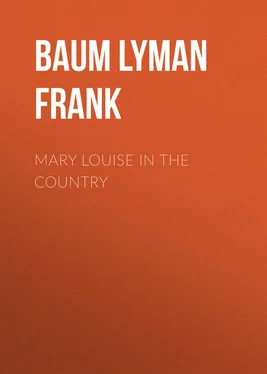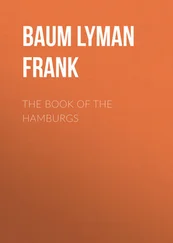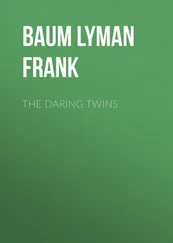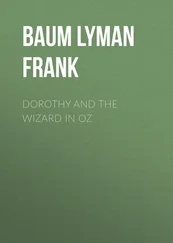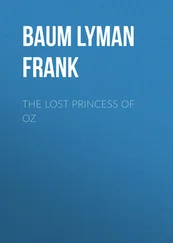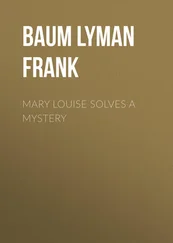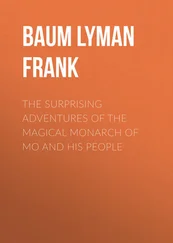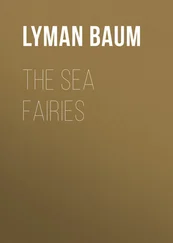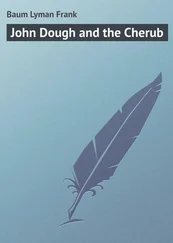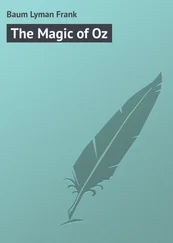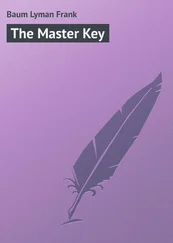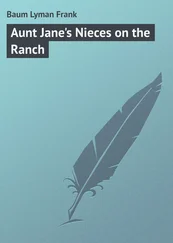Lyman Baum - Mary Louise in the Country
Здесь есть возможность читать онлайн «Lyman Baum - Mary Louise in the Country» — ознакомительный отрывок электронной книги совершенно бесплатно, а после прочтения отрывка купить полную версию. В некоторых случаях можно слушать аудио, скачать через торрент в формате fb2 и присутствует краткое содержание. Жанр: foreign_antique, foreign_prose, на английском языке. Описание произведения, (предисловие) а так же отзывы посетителей доступны на портале библиотеки ЛибКат.
- Название:Mary Louise in the Country
- Автор:
- Жанр:
- Год:неизвестен
- ISBN:нет данных
- Рейтинг книги:3 / 5. Голосов: 1
-
Избранное:Добавить в избранное
- Отзывы:
-
Ваша оценка:
- 60
- 1
- 2
- 3
- 4
- 5
Mary Louise in the Country: краткое содержание, описание и аннотация
Предлагаем к чтению аннотацию, описание, краткое содержание или предисловие (зависит от того, что написал сам автор книги «Mary Louise in the Country»). Если вы не нашли необходимую информацию о книге — напишите в комментариях, мы постараемся отыскать её.
Mary Louise in the Country — читать онлайн ознакомительный отрывок
Ниже представлен текст книги, разбитый по страницам. Система сохранения места последней прочитанной страницы, позволяет с удобством читать онлайн бесплатно книгу «Mary Louise in the Country», без необходимости каждый раз заново искать на чём Вы остановились. Поставьте закладку, и сможете в любой момент перейти на страницу, на которой закончили чтение.
Интервал:
Закладка:
"Why, he lives in that hovel!" said the girl.
"So it seems, although he may have been merely calling there."
"He fits the place," she declared. "It's old and worn and neglected, just as he and his clothes are. I'd be sorry, indeed, to discover that Mr. Cragg lives anywhere else."
The Colonel, his finger between the leaves of the book he held, to mark the place where he was reading, nodded somewhat absently and started to turn away. Then he paused to ask anxiously:
"Does this place please you, my dear?"
"Ever so much, Gran'pa Jim!" she replied with enthusiasm, leaning from her seat inside the pavilion to press a kiss upon his bare gray head. "I've a sense of separation from all the world, yet it seems good to be hidden away in this forgotten nook. Perhaps I wouldn't like it for always, you know, but for a summer it is simply delightful. We can rest – and rest – and rest! – and be as cozy as can be."
Again the old gentleman nodded, smiling at the girl this time. They were good chums, these two, and what pleased one usually pleased the other.
Colonel Hathaway had endured a sad experience recently and his handsome old face still bore the marks of past mental suffering. His only daughter, Beatrice Burrows, who was the mother of Mary Louise, had been indirectly responsible for the Colonel's troubles, but her death had lifted the burden; her little orphaned girl, to whom no blame could be attached, was very dear to "Gran'pa Jim's" heart. Indeed, she was all he now had to love and care for and he continually planned to promote her happiness and to educate her to become a noble woman. Fortunately he had saved considerable money from the remains of an immense estate he had once possessed and so was able to do anything for his grandchild that he desired. In New York and elsewhere Colonel James Hathaway had a host of influential friends, but he was shy of meeting them since his late unpleasant experiences.
Mary Louise, for her part, was devotedly attached to her grandfather and preferred his society to that of any other person. As the erect form of the old gentleman sauntered away through the trees she looked after him affectionately and wagged her little head with hearty approval.
"This is just the place for Gran'pa Jim," she mused. "There's no one to bother him with questions or sympathy and he can live as quietly as he likes and read those stuffy old books – the very name 'classics' makes me shudder – to his heart's content. He'll grow stronger and happier here, I'm sure."
Then she turned anew to revel in the constantly shifting view of river and woodland that extended panoramically from her seat in the pavilion. As her eyes fell on the old cottage opposite she was surprised to see a dishpan sail through the open window, to fall with a clatter of broken dishes on the hard ground of the yard. A couple of dish-towels followed, and then a broom and a scrubbing-brush – all tossed out in an angry, energetic way that scattered them in every direction. Then on the porch appeared the form of a small girl, poorly dressed in a shabby gingham gown, who danced up and down for a moment as if mad with rage and then, observing the washtub, gave it a kick which sent it rolling off the porch to join the other utensils on the ground.
Next, the small girl looked around her as if seeking more inanimate things upon which to vent her anger, but finding none she dashed into the cottage and soon reappeared with a much-worn straw hat which she jammed on her flaxen head and then, with a determined air, walked down the plank and marched up the path toward the bridge – the same direction that old Cragg had taken a short time before.
Mary Louise gave a gasp of amazement. The scene had been dramatic and exciting while it lasted and it needed no explanation whatever. The child had plainly rebelled at enforced drudgery and was going – where?
Mary Louise sprang lightly from her seat and ran through the grounds to their entrance. When she got to the road she sped along until she came to the bridge, reaching one end of it just as the other girl started to cross from the opposite end. Then she stopped and in a moment the two met.
"Where are you going?" asked Mary Louise, laying a hand on the child's arm as she attempted to pass her.
"None o' yer business," was the curt reply.
"Oh, it is, indeed," said Mary Louise, panting a little from her run. "I saw you throw things, a minute ago, so I guess you mean to run away."
The girl turned and stared at her.
"I don't know ye," said she. "Never saw ye before. Where'd ye come from anyway?"
"Why, my grandfather and I have taken the Kenton house for the summer, so we're to be your neighbors. Of course, you know, we must get acquainted."
"Ye kin be neighbors to my Gran'dad, if ye like, but not to me. Not by a ginger cookie! I've done wi' this place fer good an' all, I hev, and if ye ever see me here ag'in my name ain't Ingua Scammel!"
"Here; let's sit down on the bridge and talk it over," proposed Mary Louise. "There's plenty of time for you to run away, if you think you'd better. Is Mr. Cragg your grandfather, then?"
"Yes, Ol' Swallertail is. 'Ol' Humbug' is what I calls him."
"Not to his face, do you?"
"I ain't so foolish. He's got a grip on him like a lobster, an' when he's mad at me he grips my arm an' twists it till I holler. When Gran'dad's aroun' you bet I hev to knuckle down, er I gits the worst of it."
"So he's cruel, is he?"
"Uh-huh. Thet is, he's cruel when I riles him, as I got a habit o' doin'. When things runs smooth, Gran'dad ain't so bad; but I ain't goin' to stand that slave life no longer, I ain't. I've quit fer good."
"Wherever you go," said Mary Louise gently, "you will have to work for someone. Someone, perhaps, who treats you worse than your grandfather does. No one else is obliged to care for you in any way, so perhaps you're not making a wise change."
"I ain't, eh?"
"Perhaps not. Have you any other relatives to go to?"
"No."
"Or any money?"
"Not a red cent."
"Then you'll have to hire out as a servant. You're not big enough or strong enough to do much, so you'll search a long time before you find work, and that means being hungry and without shelter. I know more of the world than you do, Ingua – what an odd name you have! – and I honestly think you are making a mistake to run away from your own grandfather."
The girl stared into the water in sullen silence for a time. Mary Louise got a good look at her now and saw that her freckled face might be pretty if it were not so thin and drawn. The hands lying on her lap were red and calloused with housework and the child's whole appearance indicated neglect, from the broken-down shoes to the soiled and tattered dress. She seemed to be reflecting, for after a while she gave a short, bitter laugh at the recollection of her late exhibition of temper and said:
"It's too late to back, down now. I've busted the dishes an' smashed things gen'rally."
"That is bad," said Mary Louise; "but it might be worse. Mr. Cragg can buy more dishes."
"Oh, he can, can he? Where's the money comin' from?"
"Is he poor?"
"He ain't got no money, if that's what ye mean. That's what he says, anyhow. Says it were a godsend you folks rented that house of him, 'cause it'll keep us in corn bread an' pork for six months, ef we're keerful. Bein' keerful means that he'll eat the pork an' I gits a chunk o' corn bread now an' then."
"Dear me!" exclaimed Mary Louise in a distressed voice. "Don't you get enough to eat?"
"Oh, I manages it somehow," declared Ingua, with indifference. "I be'n swipin' one egg a day fer weeks an' weeks. Gran'dad says he'll trim me good an' plenty if he catches me eatin' eggs, 'cause all that our chickens lays he takes down to the store an' sells. But he ain't home daytimes, to count what eggs is laid, an' so I watches out an' grabs one a day. He's mighty cute, I tell ye, Gran'dad is; but he ain't cute enough to catch me at the egg-swipin'."
Читать дальшеИнтервал:
Закладка:
Похожие книги на «Mary Louise in the Country»
Представляем Вашему вниманию похожие книги на «Mary Louise in the Country» списком для выбора. Мы отобрали схожую по названию и смыслу литературу в надежде предоставить читателям больше вариантов отыскать новые, интересные, ещё непрочитанные произведения.
Обсуждение, отзывы о книге «Mary Louise in the Country» и просто собственные мнения читателей. Оставьте ваши комментарии, напишите, что Вы думаете о произведении, его смысле или главных героях. Укажите что конкретно понравилось, а что нет, и почему Вы так считаете.
